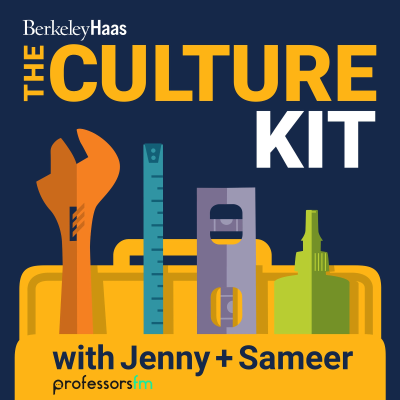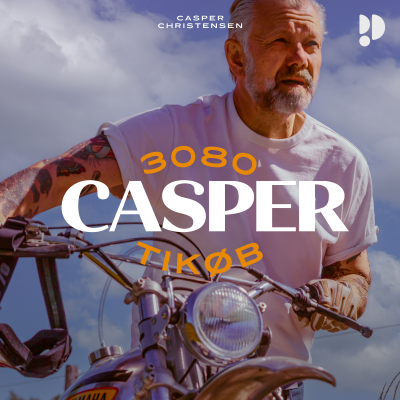
The Culture Kit with Jenny & Sameer
Podcast af Berkeley Center for Workplace Culture and Innovation
Denne podcast er gratis at lytte på alle podcastafspillere og Podimo-appen uden abonnement.
Alle episoder
16 episoderHow can artistic thinking and practices foster a healthier and more effective organizational culture? On this episode of The Culture Kit, hosts Jenny Chatman and Sameer Srivastava host a panel of four experts to discuss using art in the workplace to unleash a team’s creativity and innovation—regardless of the industry. From Google’s art-infused Quantum AI Computing Lab to new methods of teaching, the discussion revolves around the profound impact of integrating art into business, the role of AI in creative processes, and practical advice for overcoming resistance from those who don’t understand the value of the sometimes-messy creative process. Panelists: Erik Lucero leads the Google AI Quantum lab. He believes in the deep relationship between art, beauty, and the ability to innovate. Erik brought art into his new lab for the sole purpose of inspiring creativity in the team. Forest Stearns is the Principal Artist and co-founder of the Artist-in-Residence program at the Google AI Quantum project. Nir Hindie founded The Artian, a training company committed to nurturing an artistic mindset in the business environment. He’s a relentless advocate for the connections between artistic talent and business entrepreneurship as two areas that fuel each other. Léo Boussioux is an assistant professor of Information Systems at the University of Washington’s Foster School of Business. He’s passionate about the transformative power of AI in art and creativity, and believes that we all have an artist within waiting to be unleashed. This episode is based on the CultureXChange forum “Finding the Synergy between Art, Creativity, and Innovation” held on December 2, 2024 by the Berkeley Center for Workplace Culture and Innovation. Learn more. [https://haas.berkeley.edu/culture/events-and-activities/forums/] SHOW LINKS: * Why Google transformed a quantum computing lab into an artistic oasis [https://www.pbs.org/newshour/show/why-google-transformed-a-quantum-computing-lab-into-an-artistic-oasis], by Mike Cerre, PBS News, January 10, 2024: https://www.pbs.org/newshour/show/why-google-transformed-a-quantum-computing-lab-into-an-artistic-oasis * DRAWEVERYWHERE PRESENTS: Quantum A.I. Artist in Residence [https://www.youtube.com/watch?v=GCWTO8YX2uQ], video by Filmmaker in Residence J.D.Brynn / Cinedata (YouTube): https://www.youtube.com/watch?v=GCWTO8YX2uQ * Quantum Computing Inches Closer to Reality with Another Google Breakthrough [https://www.nytimes.com/2024/12/09/technology/google-quantum-computing.html], The New York Times, December 9, 2024: https://www.nytimes.com/2024/12/09/technology/google-quantum-computing.html * Forest Stearns - DRAWEVERYWHERE: [https://www.draweverywhere.com/] https://www.draweverywhere.com/ * Léo Boussioux’s website: [https://www.leobix.us/] https://www.leobix.us/ * The Artian website [https://theartian.com/]: https://theartian.com/ Do you have a vexing question about work that you want Jenny and Sameer to answer? Submit your “Fixit Ticket [https://docs.google.com/forms/d/1c6kSlpzNd_xvfyH_sg8hfBQC5ZGXML8gmJr7O3ThROI/edit]!” Learn more about the podcast and the Berkeley Center for Workplace Culture and Innovation at www.haas.org/culture-kit [http://www.haas.org/culture-kit]. *The Culture Kit with Jenny & Sameer is a production of UC Berkeley's Haas School of Business and the Berkeley Center for Workplace Culture and Innovation. It is produced by University FM.*
Despite efforts to eliminate gender bias at work, women still face barriers their male colleagues don’t. How can companies today identify whether gender bias has crept into their organization and create cultures that are supportive of women? On this episode of The Culture Kit, hosts Jenny Chatman and Sameer Srivastava are joined by Laura Kray, a professor at Berkeley Haas and the faculty director of the Center for Equity, Gender, and Leadership. Laura has been studying the psychological barriers that hold women back at work for decades. Her work sheds light on the hidden biases that persist today. Jenny, Sameer, and Laura chat about the perceived differences between male and female leaders in terms of power versus status, as well as how age plays into how women are perceived. Laura discusses her research debunking the notion that pay disparities between men and women come from differences in negotiation skills and shares strategies for business leaders to uncover and correct inequities. 3 MAIN TAKEAWAYS FROM JENNY & SAMEER’S INTERVIEW WITH LAURA KRAY: 1. Be open minded to the possibility that gender bias may have crept into your company’s culture. 2. Engage in systematic tracking and auditing of things like pay and performance reviews and adopt a data-driven approach to correcting inequities. 3. Be a confronter rather than a bystander. You don’t need to be at the top of an organization to inspire change.. SHOW LINKS: * Laura Kray’s faculty profile at the Haas School of Business, UC Berkeley [https://haas.berkeley.edu/faculty/kray-laura/] * Center for Equity, Gender and Leadership [https://haas.berkeley.edu/equity/] at Berkeley Haas * Not All Powerful People Are Created Equal: An Examination of Gender and Pathways to Social Hierarchy Through the Lens of Social Cognition, by Charlotte Townsend, Sonya Mishra, and Laura J. Kray. Psychological Science [https://journals.sagepub.com/doi/10.1177/09567976241260251] * From politicians to pop stars to professionals, gender stereotypes shape how we view power and status [https://newsroom.haas.berkeley.edu/research/from-politicians-to-pop-stars-to-professionals-gender-stereotypes-shape-how-we-view-power-and-status/], Haas News * A gender gap in managerial span of control: Implications for the gender pay gap [https://www.sciencedirect.com/science/article/pii/S0749597821000650], by Maragaret Lee and Laura J. Kray, Organizational Behavior and Human Decision Processes * The pay gap for women starts with a responsibility gap [https://www.wsj.com/articles/the-pay-gap-for-women-starts-with-a-responsibility-gap-11634224762], by Laura Kray and Margaret Lee, The Wall Street Journal * Now, women do ask: A call to update beliefs about the gender pay gap [https://journals.aom.org/doi/abs/10.5465/amd.2022.0021], by Laura J. Kray [https://journals.aom.org/doi/abs/10.5465/amd.2022.0021#], Jessica A. Kennedy [https://journals.aom.org/doi/abs/10.5465/amd.2022.0021#] and Margaret Lee [https://journals.aom.org/doi/abs/10.5465/amd.2022.0021#], Academy of Management Discoveries * New research shatters outdated pay-gap myth that women don’t negotiate [https://newsroom.haas.berkeley.edu/research/new-research-shatters-outdated-pay-gap-myth-that-women-dont-negotiate/], by Laura Counts, 2024 * Agentic but not warm: Age-gender interactions and the consequences of stereotype incongruity perceptions for middle-aged professional women [https://www.sciencedirect.com/science/article/pii/S0749597822000796], by Jennifer A. Chatman, Daron Sharps, Sonya Mishra, Laura J. Kray, Michael S. North. Organizational Behavior and Human Decision Processes * Creativity from constraint? How the political correctness norm influences creativity in mixed-sex work groups [https://journals.sagepub.com/doi/abs/10.1177/0001839214563975], by Jack A. Goncalo, Jennifer A. Chatman, Michelle M. Duguid, and Jessica A. Kennedy, Administrative Science Quarterly * Cultures of Genius at Work: Organizational Mindsets Predict Cultural Norms, Trust, and Commitment [https://psycnet.apa.org/record/2020-17226-010], by Elizabeth A. Canning, Mary C. Murphy, Katherine T. U. Emerson, Jennifer A. Chatman, Carol S. Dweck, and Laura J. Kray, Personality and Social Psychology Bulletin. Do you have a vexing question about work that you want Jenny and Sameer to answer? Submit your “Fixit Ticket [https://docs.google.com/forms/d/1c6kSlpzNd_xvfyH_sg8hfBQC5ZGXML8gmJr7O3ThROI/edit]!” Learn more about the podcast and the Berkeley Center for Workplace Culture and Innovation at www.haas.org/culture-kit [http://www.haas.org/culture-kit]. *The Culture Kit with Jenny & Sameer is a production of UC Berkeley's Haas School of Business and the Berkeley Center for Workplace Culture and Innovation. It is produced by University FM.*
“Tribalism” has a generally negative reputation these days. It’s often used to refer to an us-versus-them mentality, or a culture that’s divisive and exclusionary. But that perception, according to cultural psychologist Michael Morris, “could not be more inaccurate as a description of what human tribal instincts are. They're instincts for solidarity, not for hostility.” On this episode of The Culture Kit, hosts Jenny Chatman and Sameer Srviastava interview Michael Morris, a professor at Columbia Business School, about his new book Tribal: How the Cultural Instincts That Divide Us Can Help Bring Us Together. Jenny, Sameer, and Michael discuss how tribal instincts allowed humans to break away from the primate back, and how these deeply ingrained instincts show up in organizations today. They also delve into modern and historical examples of leaders utilizing tribalism to adapt culture and even heal rifts. 3 MAIN TAKEAWAYS FROM JENNY & SAMEER’S INTERVIEW WITH MICHAEL MORRIS: Leaders can recognize and harness the three main types of tribal psychology: 1. The Peer Code – This is the impulse to match the behavior of the people around us.These norms allow for the smooth functioning of human interaction and are the basis for collaboration. 2. The Hero Code – This is the emulation of those with status or prestige. This instinct is triggered by symbols. 3. The Ancestor Code – This is the curiosity and urge to maintain the traditions and customs of past generations. This instinct is triggered by ceremonies and rituals. SHOW LINKS: * Tribal: How the Cultural Instincts That Divide Us Can Help Bring Us Together [https://www.amazon.com/Tribal-Mastering-Cultural-Codes-Behavior-ebook/dp/B07TZZN2X6], by Michael Morris * Michael Morris’ Website [https://www.michaelwmorris.com/] * “A Language-Based Method for Assessing Symbolic Boundary Maintenance between Social Groups [https://journals.sagepub.com/doi/full/10.1177/00491241221099555].” By Anjali Bhatt, Amir Goldberg, and Sameer B. Srivastava. Sociological Methods & Research, 2022. * “Two-Sided Cultural Fit: The Differing Behavioral Consequences of Cultural Congruence Based on Values Versus Perceptions [https://pubsonline.informs.org/doi/10.1287/orsc.2023.1659].” By Richard Lu, Jennifer A. Chatman, Amir Goldberg, and Sameer B. Srivastava. Organization Science, 2024. * 2025 Culture Connect Conference [https://haas.berkeley.edu/culture/berkeley-haas-culture-conference/2025-culture-connect-conference/], Berkeley Center for Workplace Culture and Innovation Do you have a vexing question about work that you want Jenny and Sameer to answer? Submit your “Fixit Ticket [https://docs.google.com/forms/d/1c6kSlpzNd_xvfyH_sg8hfBQC5ZGXML8gmJr7O3ThROI/edit]!” Learn more about the podcast and the Berkeley Center for Workplace Culture and Innovation at www.haas.org/culture-kit [http://www.haas.org/culture-kit]. *The Culture Kit with Jenny & Sameer is a production of UC Berkeley's Haas School of Business and the Berkeley Center for Workplace Culture and Innovation. It is produced by University FM.*
Should corporate leaders speak out on social and political issues? And if they decide to do so, what’s the best approach? On this episode of The Culture Kit, hosts Jenny Chatman and Sameer Srivastava chat with Matt Kohut, a leadership communications expert, about his new book Speaking Out: The New Rules of Business Leadership Communications. Jenny, Sameer, and Matt dig into historical examples of corporations and politics colliding, the potential pros and cons of deciding to weigh in on social issues, and strategies for business leaders to evaluate risk and maintain accountability when deciding to speak out. This episode’s question came from Laszlo Bock, co-founder of Humu and former Senior Vice President of People Operations at Google. 3 MAIN TAKEAWAYS FROM JENNY & SAMEER’S INTERVIEW WITH MATT KOHUT: 1. Should you take a position at all? This should always be the first step before deciding what the position is or how to communicate it. 2. Mission relevance: What are your organization’s values and how will taking a stance on an issue align with those values? 3. Evaluate risk: How might this position potentially backfire? Hold a pre-mortem meeting to help determine risk. SHOW LINKS: * Speaking Out: The New Rules of Business Leadership Communications by Matthew Kohut (October 2024) [https://press.georgetown.edu/Book/Speaking-Out] * Compelling People: The Hidden Qualities That Make Us Influential by Matthew Kohut and John Neffinger [https://www.penguinrandomhouse.com/books/311040/compelling-people-by-john-neffinger/] * “When to Talk Politics in Business: Theory and Experimental Evidence of Stakeholder Responses to CEO Political Activism. [https://www.vanessaburbano.com/uploads/2/5/0/4/25049117/bondi_burbano_dellacqua_whentotalkpolitics_20230213.pdf]” Working paper by Tommaso Bondi, Vanessa Burbano, and Fabrizio Dell’Acqua. Cornell Tech and SC Johnson School of Management, Cornell University, New York, 2023. Do you have a vexing question about work that you want Jenny and Sameer to answer? Submit your “Fixit Ticket [https://docs.google.com/forms/d/1c6kSlpzNd_xvfyH_sg8hfBQC5ZGXML8gmJr7O3ThROI/edit]!” Learn more about the podcast and the Berkeley Center for Workplace Culture and Innovation at www.haas.org/culture-kit [http://www.haas.org/culture-kit]. *The Culture Kit with Jenny & Sameer is a production of UC Berkeley's Haas School of Business and the Berkeley Center for Workplace Culture and Innovation. It is produced by University FM.*
In the season two premiere of The Culture Kit, hosts Jenny Chatman and Sameer Srivastava tackle the complex question of how to create a culture of inclusion and belonging in the face of growing polarization in the workplace and society at large. To help answer this question, Jenny and Sameer turn to DEI expert Jarvis Sam. Jarvis is the CEO and founder of the strategy firm, Rainbow Disruption, which advises organizations on developing practical solutions that champion DEI in the workplace. Before that, Jarvis was the Chief Diversity, Equity, and Inclusion Officer at Nike, where he spearheaded initiatives to enhance diverse representation and foster inclusive leadership. He also led organizational efforts around DEI with athletes like Serena Williams and Lebron James, as well as leagues like the WNBA and NFL. Jenny, Sameer, and Jarvis discuss what an inclusive culture really means, go over actionable steps leaders can take to create and manage a culture of inclusion and belonging, and address some of the biggest myths and misconceptions surrounding DEI. SHOW LINKS: Resources referenced by Jarvis Sam: * The Rainbow Disruption [https://www.rainbowdisruption.com/] * DEI C.R.E.D.E.N.T.I.A.L by Jarvis Sam [https://www.amazon.com/Dei-C-R-D-N-T-I-L/dp/B0CHDQKP6R] * Amy C. Edmondson on psychological safety [https://amycedmondson.com/psychological-safety/] * Uncovering Talent: A New Model of Inclusion [https://www2.deloitte.com/content/dam/Deloitte/us/Documents/about-deloitte/us-about-deloitte-uncovering-talent-a-new-model-of-inclusion.pdf], by Christie Smith and Kenji Yoshino, Deloitte, 2018. Research by Jenny Chatman on group diversity: * Blurred Lines: How the Collectivism Norm Operates Through Perceived Group Diversity to Boost or Harm Group Performance in Himalayan Mountain Climbing [https://pubsonline.informs.org/doi/abs/10.1287/orsc.2018.1268] (PDF [https://drive.google.com/file/d/1psfzK6pmk-ktGUV4vOPXLBs85_eHIqJ3/view]), By Jennifer A. Chatman, Lindred L. Greer, Eliot Sherman, Bernadette Doerr, Organization Science, 2019 * Political Correctness and Group Composition: A Research Agenda [https://drive.google.com/file/d/17f0rLJtJoJp7bVemZ9R84HAIzuJJfLAj/view], By Jennifer A. Chatman, Jack A. Goncalo, Jessica R. Kenndy, and Michelle M. Duguid. Research on Managing Groups and Teams * Being distinctive versus being conspicuous: The effects of numeric status and sex-stereotyped tasks on individual performance in groups, [https://drive.google.com/file/d/1-GbjcLdk0TI64jCbyDwuBpkaKt5OsywK/view] By Jennifer A. Chatman, Alicia D. Boisnier, Sandra E. Spataro, Cameron Anderson, and Jennifer L. Berdahl. Organizational Behavior and Human Decision Processes. * The Influence of Demographic Heterogeneity on the Emergence and Consequences of Cooperative Norms in Work Teams Academy of Management Journal [https://drive.google.com/file/d/1Pqykq2TOZ1ROFcfiUSyOfpO2ZlrWagCN/view], by Jennifer A. Chatman and Francis J. Flynn, Academy of Management Journal. Research by Sameer Srivastava on measuring culture through language using AI tools: * The New Analytics of Culture [https://hbr.org/2020/01/the-new-analytics-of-culture], by Matthew Corritore, Amir Goldberg, and Sameer B. Srivastava, Harvard Business Review, 2020 * How can AI Enrich Our Understanding of Organizational Culture? [https://faculty.haas.berkeley.edu/srivastava/papers/AI%20and%20Culture%20-%20Goldberg%20and%20Srivastava.pdf] By Amir Goldberg and Sameer B. Srivastava, Management and Business Review, 2022 * Language as a Window into Culture [https://journals.sagepub.com/doi/abs/10.1177/0008125617731781?casa_token=CN0bkekDpIgAAAAA%3A4Fg0MItD-s6DKDk6ReP4HJJnFbEAt9eVOjXZjvhboX8bW-n8ppQWcCi61LUf-W3KZjfpcvV3IB-a1Q&journalCode=cmra], by Sameer B. Srivastava and Amir Goldberg, California Management Review, 2017 Related episodes of The Culture Kit with Jenny & Sameer: * Amy Edmondson & Steve Brass on Psychological Safety [https://the-culture-kit-with-jenny-sameer.simplecast.com/episodes/bonus-episode-4-amy-edmondson-steve-brass-on-psychological-safety] * How to Keep Remote Workers Connected to the Mission, with Hubspot CEO Yamini Rangan [https://the-culture-kit-with-jenny-sameer.simplecast.com/episodes/how-to-keep-hybrid-workers-connected-to-the-mission] Three main takeaways from Jenny & Sameer’s interview with Jarvis Sam: 1. Know your “why”: Organizations need to ask, “Why are we doing this work from the very beginning? And how does that link to key actions that we may have taken previously? 2. Comprehensive integration is key: Inclusion can’t be an add-on. It should be a key attribute in every area of the organization including talent acquisition, management, and succession planning. 3. DEI Is not just for underrepresented communities: Inclusive cultures are ones where every team member feels that they can show up as their truest selves. Do you have a vexing question about work that you want Jenny and Sameer to answer? Submit your “Fixit Ticket [https://docs.google.com/forms/d/1c6kSlpzNd_xvfyH_sg8hfBQC5ZGXML8gmJr7O3ThROI/edit]!” Learn more about the podcast and the Berkeley Center for Workplace Culture and Innovation at www.haas.org/culture-kit [http://www.haas.org/culture-kit]. *The Culture Kit with Jenny & Sameer is a production of UC Berkeley's Haas School of Business and the Berkeley Center for Workplace Culture and Innovation. It is produced by University FM.*
Tilgængelig overalt
Lyt til Podimo på din telefon, tablet, computer eller i bilen!
Et univers af underholdning på lyd
Tusindvis af lydbøger og eksklusive podcasts
Ingen reklamer
Spild ikke tiden på at lytte til reklamepauser, når du lytter til Podimos indhold.



















